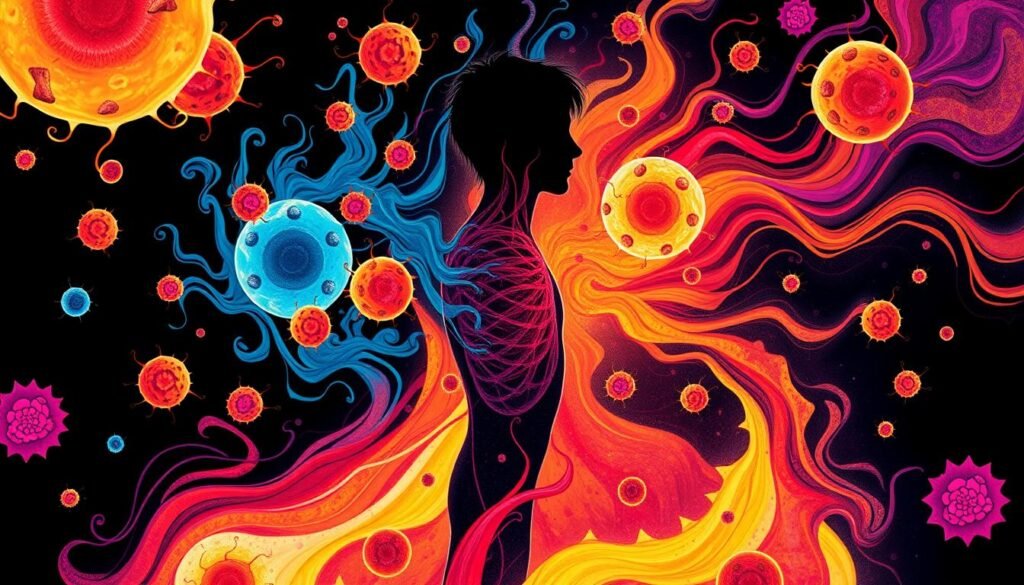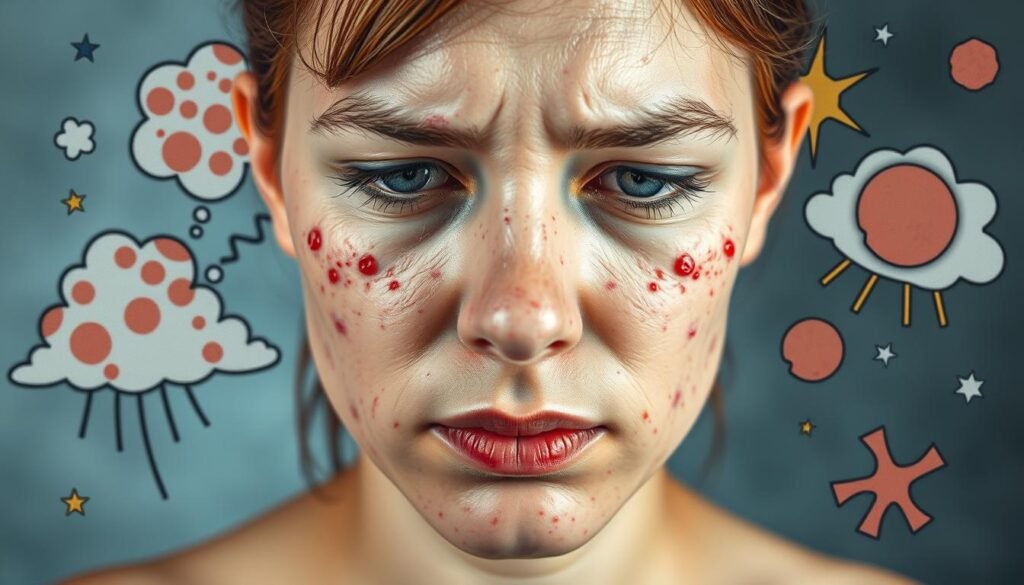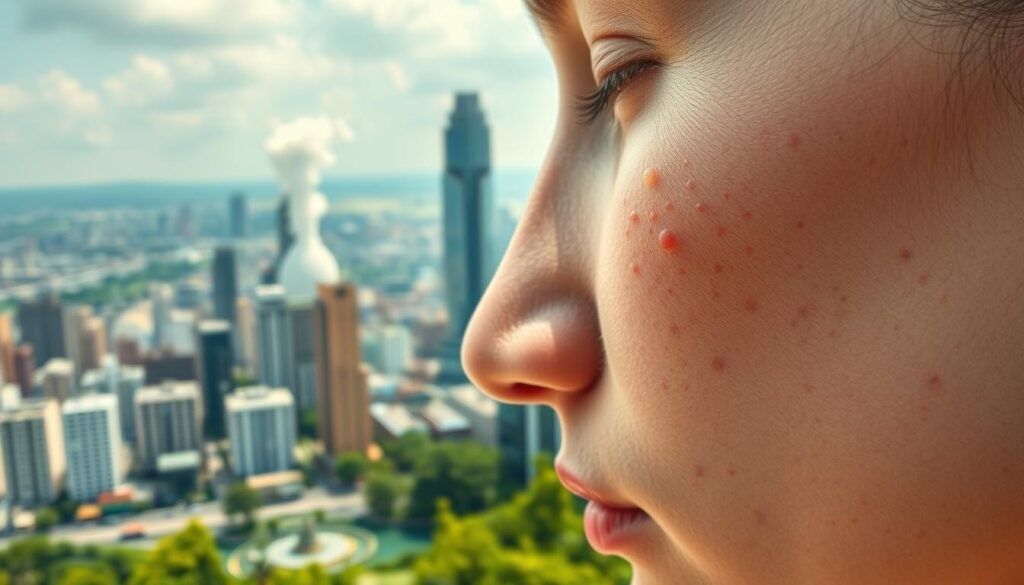Over 50 million people in the U.S. struggle with acne annually. It’s not only about skin. Stress plays a huge role, affecting around 67% of final-year med students. As research grows, we understand how stress, especially cortisol, impacts our skin.
Stress increases cortisol, which can make oil glands work overtime. This leads to blocked pores and acne. Escaping this cycle of stress and breakouts can be hard without the right help.
Knowing how stress and acne are connected is key for anyone dealing with skin problems. There are ways to manage stress that may also ease acne. Mindfulness, yoga, and leading a healthy life can make a big difference. They improve skin and boost overall happiness.
Key Takeaways
- Cortisol is a key stress hormone linked to increased acne severity.
- Stress affects oil production in sebaceous glands, influencing acne breakouts.
- Stress management techniques can significantly reduce acne symptoms.
- A balanced diet and regular exercise support healthy skin and hormone regulation.
- Consulting a dermatologist is essential for personalized acne treatment plans.
The Link Between Stress and Acne
Stress has a big role in both starting and worsening acne. High stress can lead to more cortisol, which means our skin might produce more oil. This extra oil can block pores and cause acne. The link between Stress and Acne gets clearer because high cortisol can also make conditions like rosacea or eczema worse.
Studies show that stress and acne severity are closely related. For instance, students often get worse acne during exams due to stress. Using stress management tactics can improve skin health. Doing things that make us happy can lower cortisol, leading to clearer skin.
Those with acne should not ignore their skincare routine. Skipping it can increase stress and make skin problems worse. Long-term stress weakens the skin’s defense, making it harder to heal. This can worsen conditions like eczema and rosacea.
Adult acne often shows up during stressful times, especially with hormonal changes. It can appear as breakouts on the chin or jawline. Understanding the Stress and Acne Connection is key. High stress can cause breakouts on the back and chest too. Managing stress and taking care of your skin can really help.
| Factors | Effects on Acne |
|---|---|
| High Cortisol Levels | Increased oil production, leading to clogged pores |
| Inflammation | Exacerbation of existing skin conditions |
| Insufficient Sleep | Poor stress management, worsened skin appearance |
| Lack of Joyful Activities | Increased cortisol levels, contributing to acne |
| Neglecting Skincare | Worsening of skin conditions, elevated stress |
Understanding Cortisol: The Stress Hormone
Cortisol is known as the stress hormone. It plays a big role in how we handle stress. Our bodies release cortisol to manage functions such as immune response and reducing inflammation. Too much or too little cortisol can cause health problems like acne.
Cushing syndrome is one condition that raises cortisol levels. It makes people’s faces round and puffy due to fat. Besides changing skin, it can cause weight gain, purple stretch marks, and high blood pressure. It shows how a hormonal imbalance can affect our health.
Stress can make acne worse by raising certain hormone levels. This triggers inflammation around sebaceous glands. Because cortisol increases the production of cytokines, the inflammation can get worse. This can make acne outbreaks more severe. Not sleeping enough, not exercising, and eating poorly can also affect cortisol. This impacts skin health.
Studies back up these links between cortisol, stress, and health issues. Tests like blood, urine, or saliva tests can check cortisol levels. This helps diagnose conditions like Cushing syndrome.

To manage high cortisol levels, medical help might be needed. Treatments vary from changing lifestyle to taking medication for issues like adrenal insufficiency. Knowing about cortisol shows why it’s crucial to manage stress. It helps keep our hormones balanced, our skin healthy, and improves our well-being.
Cortisol and Acne: The Physiological Connection
Cortisol is known as the stress hormone and is key in acne development. High cortisol levels lead to skin problems. Knowing its effects can help manage skin health better.
Impact of Cortisol on Sebaceous Glands
Stress makes cortisol tell sebaceous glands to produce more sebum. More oil can block pores and cause acne. Women might get more oily skin from stress-related hormonal changes. Studies show long-term stress worsens sebaceous gland activity, messing up skin oil regulation.
How Stress Increases Inflammation
High cortisol levels boost skin inflammation, which helps acne form. Long-term stress boosts cytokines and antibodies, causing ongoing inflammation. This makes skin problems worse and clearing acne harder. Stress also slows down wound healing, making acne scars more likely.
Types of Acne Influenced by Stress
Acne can show up in different forms, each affected by factors like stress. Stress causes cortisol to rise, making some acne worse. Knowing these types helps us manage them better.
Comedonal Acne
Comedonal acne appears as blackheads and whiteheads because pores get clogged. Stress makes it worse by boosting skin oil, leading to more clogs.
Inflammatory Acne
This acne type comes with redness and swelling, often from infection. Stress doesn’t just raise body inflammation—it can make acne issues bigger. Stressful feelings might make us touch our faces more, which doesn’t help.
Cystic Acne
Cystic acne is deeply painful and can scar. It gets worse when stress messes with hormones, showing how crucial stress management is in treatment.

| Type of Acne | Description | Impact of Stress |
|---|---|---|
| Comedonal Acne | Clogged pores leading to blackheads and whiteheads. | Increased oil production due to cortisol. |
| Inflammatory Acne | Red, swollen lesions often infected with bacteria. | Heightened inflammation and potential for aggravation. |
| Cystic Acne | Deep, painful lesions, often arising from hormonal imbalances. | Severe outbreaks linked to stress-induced hormonal changes. |
Knowing how stress affects different kinds of acne helps us choose the right skin care and stress management.
The Role of Hormonal Imbalance in Acne
It’s key to know how hormonal imbalances lead to acne causes. Stress can change hormone levels, like cortisol, making acne worse. High cortisol makes the skin’s oil glands produce more oil, causing breakouts. These changes happen at different times in life, affecting all ages.
How Stress Affects Hormonal Levels
Stress causes our bodies to get ready to act, raising cortisol. This increase also boosts androgens, which make sebum. Together, these hormones can harm skin health. Studies link hormonal changes during stressful times to acne, especially in those already likely to have skin problems.
Impact on Youth and Adult Acne
Acne is more common at different ages. Around 80% of teens have acne, starting at puberty. While many teens see their acne go away, adults, particularly women, can have hormonal acne into their 30s and further. Studies show 12% to 54% of adult women get acne, showing hormonal imbalance can last past teenage years. Knowing this is important for finding the right treatments.
| Age Group | Prevalence of Acne | Key Hormonal Influences |
|---|---|---|
| Adolescents (11-30) | 80% | Increased androgens, cortisol |
| Youth (15-18) | 100% | Stress hormones, sebaceous activity |
| Adults (18-54) | 12-54% | Estrogen, progesterone, hormonal treatments |
Acne Causes Beyond Stress
Stress is a big factor in acne severity, but there’s more to it. People may have genetic traits that make them more likely to get acne. Also, things in the environment can make skin problems worse.
Genetic Factors
Genes are crucial in acne development. Studies show that if your family has skin issues, you might too. About 37.4% of women and 24.8% of men aged 20 to 49 get acne. For women, hormonal changes can make the skin oilier and prone to acne.
This shows how vital it is to know your family’s skin history.
Environmental Influences
The environment also affects acne. Pollution, humidity, and what you eat can all make it worse. Pollutants block pores, and humidity can make your skin oilier. Foods high in sugar and dairy can mess with your hormones, leading to acne.

| Factor | Impact on Acne |
|---|---|
| Genetic Predisposition | Higher likelihood of experiencing acne due to family history. |
| Pollution | Contributes to clogged pores and increased breakouts. |
| Humidity | Encourages excess oil production leading to acne. |
| Dietary Choices | High sugar and dairy intake may provoke hormonal fluctuations. |
Skin Inflammation and Its Relation to Cortisol
Cortisol is important when it comes to skin inflammation, like with acne. Stress causes more cortisol to form in our bodies. This leads to more pro-inflammatory cytokines, making skin conditions worse.
Our sebaceous glands make more sebum when cortisol goes up. This extra oil blocks pores and leads to acne. Elevated cortisol is not just about acne, though. It can also cause redness, rashes, and hives, making other skin issues worse.
Cortisol can also harm collagen production. This might make the skin less elastic and age faster. It can even cause skin to crack and get infected easier. This shows how important it is to handle stress. By doing so, we can keep our skin healthier and avoid stress-related acne.
Stress Management Techniques for Acne Prevention
Keeping stress in check is key to clear skin and stopping acne. The mind-body connection shows how our feelings impact our skin. Using ways to manage stress can help avoid acne.
Mindfulness and Relaxation Techniques
Meditation, deep breathing, and writing down feelings can reduce anxiety. Studies show daily mindfulness cuts down cortisol, which fights oily skin. This not only calms the mind but also improves skin.
The Benefits of Regular Exercise
Regular activity is a top way to handle stress. It helps balance hormones, lifts mood, and lowers cortisol. This means less acne for people with oily skin. Making exercise a habit is good for skin and self-confidence.
Establishing a Healthy Sleep Routine
Good sleep is vital for controlling stress and fixing skin. Not sleeping enough can raise cortisol and acne risk. Getting 7-9 hours of sleep each night helps the body recover and keeps hormones in check. Sleep well to lower stress and aid skin healing.
Using these methods daily can make skin stronger and less prone to stress acne. If acne remains a problem, seeing a doctor or therapist might help. For more on stress and acne, read this useful article.
| Technique | Benefits | Recommendations |
|---|---|---|
| Mindfulness and Relaxation | Reduces anxiety and stress | Practice daily for 10-15 minutes |
| Regular Exercise | Balances hormones and improves mood | Aim for 30 minutes most days |
| Healthy Sleep Routine | Promotes skin repair and lowers cortisol | Maintain consistent sleep schedule |
Holistic Acne Treatment Approaches
Looking at acne from a holistic angle can really change things for those dealing with it. This approach goes deep to find and fix the real problems, not just the visible issues. It includes changing your lifestyle, eating better, and handling stress better to make a plan that works for you.
Eating right is key in holistic acne treatment. Eating lots of fruits, veggies, and enough protein helps your gut stay healthy. This is important to lessen inflammation. Try to eat less processed foods, cut down on sugar, and drink less alcohol, as these can make acne worse. Using Stress Management techniques like mindful practices and working out helps your skin too.
Natural remedies are also a big help. Tea tree oil, for example, fights inflammation and bacteria, great for treating spots. Aloe vera, with its salicylic acid and zinc, can be as good as many store-bought acne products. Plus, manuka honey from New Zealand is a strong antibacterial, really helping with acne.
It’s important to consider hormones, especially in women. Many women get more acne when their hormones change during their period. Holistic treatments might use certain herbs and vitamins to balance hormones and ease PMS symptoms. Keeping your liver working right is also key for balancing hormones, showing how everything in your body is connected in keeping your skin clear.
| Holistic Treatment Methods | Benefits |
|---|---|
| Mindfulness Meditation | Reduces stress, leading to lower cortisol levels and less acne |
| Regular Physical Activity | Improves hormone regulation and enhances overall well-being |
| Nutrient-Rich Diet | Supports gut health and reduces inflammation |
| Natural Topicals | Offers targeted relief using ingredients like tea tree oil and manuka honey |
| Lymphatic Drainage Treatments | Detoxifies the skin and enhances nutrient absorption |
In conclusion, going for holistic acne treatments can really make a difference in skin health. By keeping a balanced diet, using natural solutions, and managing stress well, people can take charge of their skin. This well-rounded method often leads to lasting happiness and health.
Consulting a Dermatologist for Acne Solutions
Seeing a specialist is key for getting the right acne help, especially for tough cases. A dermatologist figures out what your skin really needs. They check your skin type, how bad the acne is, and look for other skin issues. This way, they can pick the best treatment just for you.
- Topical Treatments: Products like tretinoin, benzoyl peroxide, and antibiotics work well. They deal with big oil glands and kill skin bacteria.
- Oral Medications: For harder cases, doctors might give pills like tetracycline and doxycycline.
- Cortisone Injections: These shots help with serious, deep acne by lowering swelling fast.
- Advanced Therapies: Techniques like photodynamic therapy (PDT) often need 3-6 visits for lighter to medium acne.
- Microdermabrasion and Chemical Peels: These treatments make skin smoother and look better. They also help with lines, wrinkles, and acne scars.
Sometimes, drugs from the store don’t work well, taking six to eight weeks to see changes. For stubborn acne, a skin doctor can offer stronger medicines. They make sure the treatment fits you perfectly.
Talking to a skin doctor about acne helps you find good answers. They guide you, making your skincare journey sure and confident. They don’t just focus on pimples but also on things like stress that can make acne worse. Getting a treatment plan made just for your skin means you’re on your way to clearer, healthier skin.
| Treatment Option | Description | Number of Sessions/Duration |
|---|---|---|
| Photodynamic Therapy | Reduces acne through light treatments | 3-6 sessions |
| Microdermabrasion | Improves skin texture and reduces scars | As needed |
| Chemical Peels | Enhances skin tone and removes dead skin | As needed |
| Cortisone Injections | Reduces inflammation in cystic acne | Single treatment |
Conclusion
Understanding how cortisol and acne are connected is key for good skin care. Chronic stress can raise cortisol levels, making acne worse. It leads to more inflammation and too much sebum. Clearly, keeping stress in check is important for keeping your skin healthy. Taking care of your mental health is crucial for your skin’s success. Also, studies show that stress and acne flare-ups often go hand in hand. So, managing stress is a must for those dealing with acne.
Treating acne works best with a holistic approach. It helps to practice mindfulness, exercise, and get enough sleep. But it’s also key to seek professional help. A healthcare provider can offer tailored acne solutions that take both skin care and mental health into account. This step is proactive for clearer skin. Support along the way can assist in dealing with chronic acne, requiring ongoing effort.
In wrapping up, controlling cortisol levels is essential for healthier skin. A broad approach to tackling stress and skin care can boost both mental and skin health. For deeper insights into effective acne treatments, click on acne treatment insights. It explores this complex topic further.